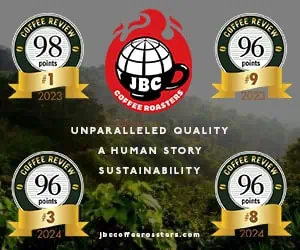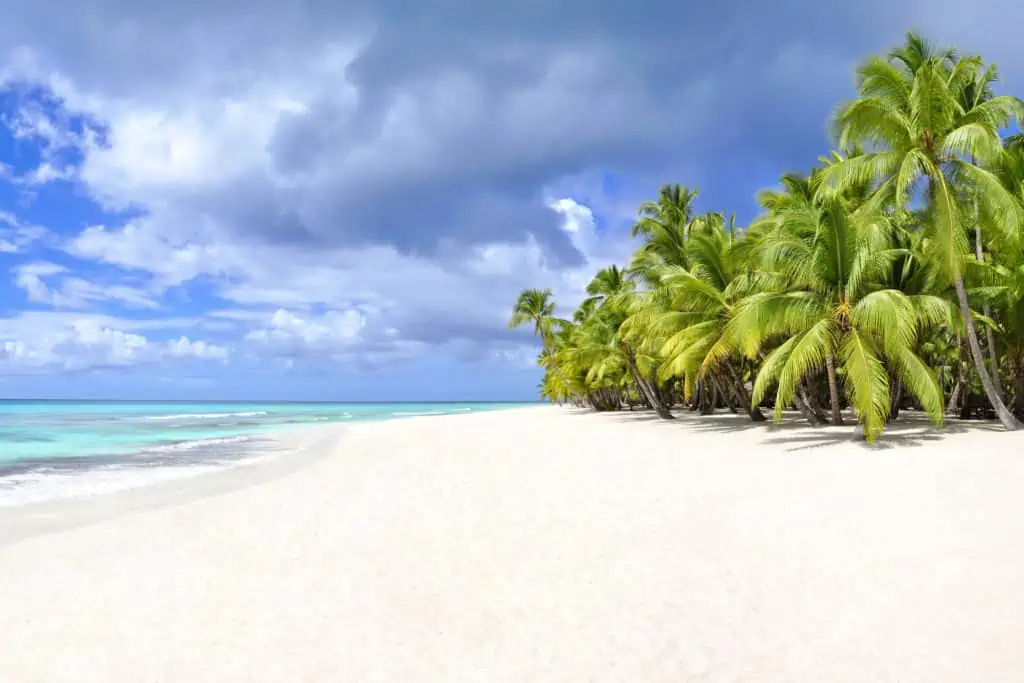
For most of the world, the first months of 2020 have been a challenging season, with millions across the globe either anticipating, in the throes of, or rebounding from the COVID-19 pandemic. For the past two months, Berkeley, California, where Coffee Review is based, has been under a statewide shelter-in-place order. Whether we’re too busy or not busy enough, we’ve all had time at home to experience our own rhythms, conflicts and synchronicities with the rhythms of others, in-person and remote — and Zoom meetings — lots of Zooming, for kids’ classes, business meetings, wine tastings, and more. If we’re lucky, we will have also had time for reflection, to carve out a bit of contemplative space. Daily, I have been meditating on the potential positives of this frightening time, and my beverage companion for this rumination is — you guessed it — coffee.
The poet John Milton (1608-1674) wrote:
One sip of this
Will bathe the drooping spirits in delight
Beyond the bliss of dreams.
It is in this spirit that we offer a post-millennial ode to the transformative power of coffee in this unprecedented time, Coffee Review-style. For our May tasting report, we asked many of our roaster colleagues to send in one coffee they would choose as a “desert-island” beverage, a “stuck-at-home” coffee. Here we review 15 coffees that the three of us (Kenneth Davids, Jason Sarley, and I) blind-cupped and scored between 93 and 96, along with narratives (from the roasters and the Coffee Review team) that tell the stories of these coffees from an utterly subjective perspective.
We don’t often dip into our personal preferences here on the site, preferring to offer you our collective sensory analysis skills — and we’ve done that, as usual, with the reviews associated with this report. But the report itself is more about what we love, and why.
The 15 coffees we feature here come from roasters in 9 different U.S. states (Virginia, California, Texas, Hawai’i, New Jersey, Minnesota, Washington, Colorado, and North Carolina) as well as Taiwan and Hong Kong, while their coffees come from even more far-flung places: Ethiopia, Kenya, DR Congo, Rwanda, Hawai’i, Panama, Colombia, Ecuador, and Sumatra. What this is virtual coffee map is a testament to, above all, is the diversity of not only what we like to drink but also of all the places in the world that great coffee touches. We’ve always known this, of course, but when we do our typical deep-dive reports on one region, processing method or tree variety, we tend to forget that different coffees offer different experiences for everyone, everywhere.
The 15 roasters who submitted these coffees were given a deceptively simple task: to choose one “desert-island” coffee to enjoy during the time we’re all largely spending at home. Some approached the question from the point-of-view that rare, unusual coffees would fit the bill, while others chose comfort coffees of which they would never tire — classics or homey blends.
Here are the 15 coffees we loved for their wide-ranging “desert island” pleasures.
The Distilled Essence of Sidama
Washed Ethiopia Shantawene/Red Rooster Coffee Roaster/Floyd, Virginia (96 points)
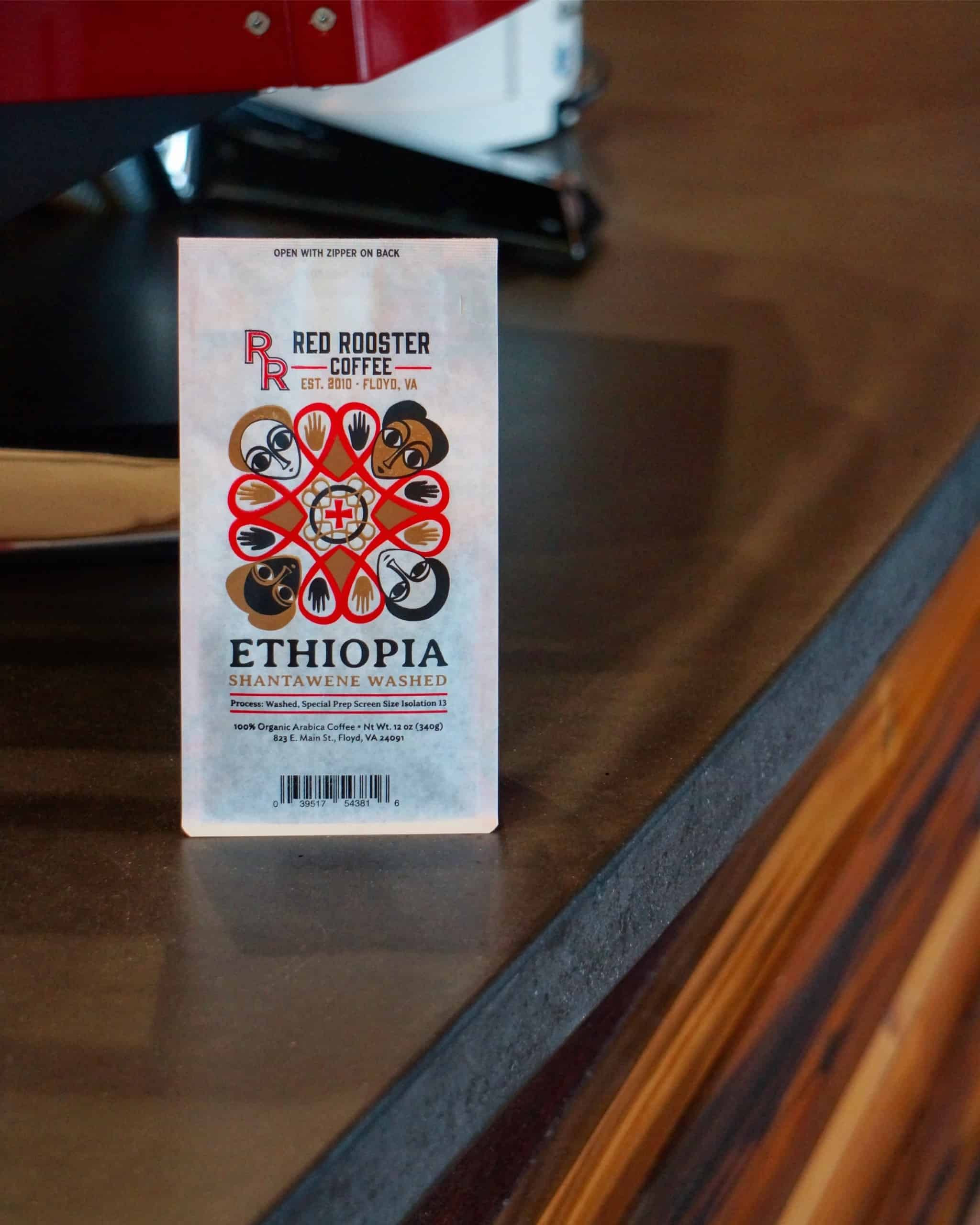
Red Rooster’s Ethiopia Shantawene. Courtesy of Tony Greatorex.
Red Rooster Coffee, in the pastoral hamlet of Floyd, Virginia, is on fire with its sourcing, roasting, and community engagement initiatives, consistently putting put some of the finest coffees available. Head roaster Tony Greatorex says, “When thinking about a desert-island coffee, my baseline is Ethiopia. Along with dynamic flavor profiles boasting fruit, florals, and vibrant acidity, they’re often very affordable compared to Geishas coming from Latin America. This unique coffee, which we imported from Catalyst Trade, is screen-sorted to the size designation of 13, while the typical lots we buy would be a variety of screen sizes. The consistent bean size lends itself to very even roasting, making the dialing-in process easier. As for the effect on flavor, it is completely anecdotal, but I feel like removing all other screen sizes distilled the classic Ethiopia profile, bringing into sharp focus its clean, floral sweetness and pleasing acidity. To me, it would be the perfect coffee to keep me going if I found myself stranded on an island, or at home as it were.”
Coffee Review’s Jason’s poetic take: “For those lovers of the classic washed Ethiopia profile, this coffee from Red Rooster hits all the notes — it’s citrusy and bright, floral-toned, and chocolaty, with a monolithic depth of sandalwood and other spices. Like the emergence of sunnier days in these difficult times, coffees like this one can lift us up, promising renewal and joy with every satisfying sip.”
A Classic Blend Taken to New Heights
Mocha Java/Thanksgiving Coffee Company/Fort Bragg, California (96 points)
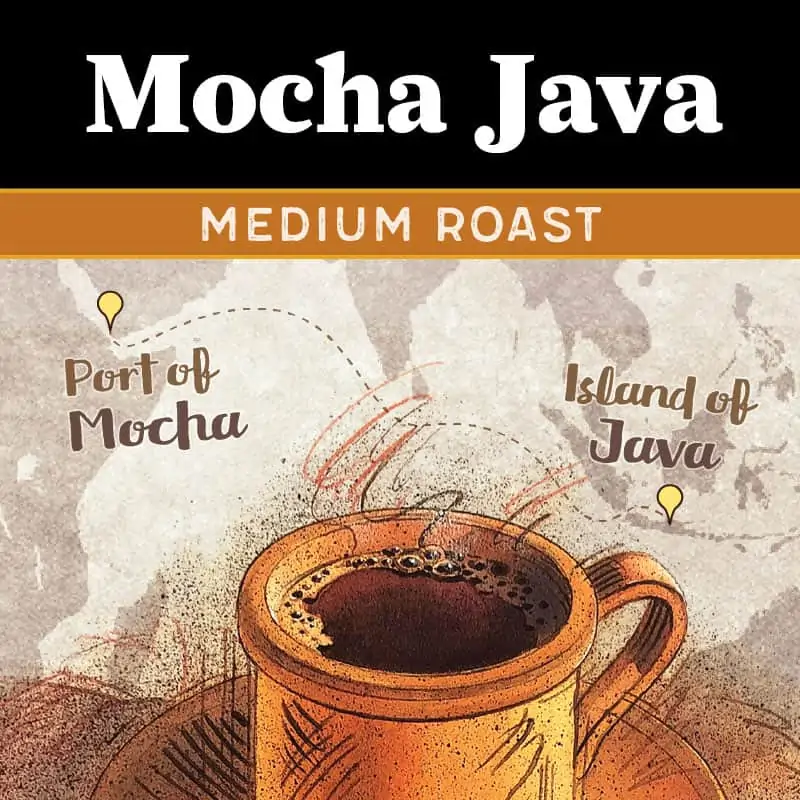
Thanksgiving Coffee’s Mocha Java. Courtesy of Thanksgiving Coffee.
Thanksgiving Coffee has long had a passion for Mocha Java, a blending concept that dates back to the 15th century when coffee from Yemen and from the island of Java were the only coffees produced commercially in the world. This modern twist replaces the Yemen Mocha with a natural- and a washed-process Ethiopia and pairs them with a wet-hulled Sumatra. Roaster Jacob Long says, “We chose to highlight our Mocha Java blend because folks stuck at home can brew up a cup of this coffee, sit back and take a mental vacation to faraway places. We get the opportunity to educate consumers about the early history of Coffea arabica production and trade and answer some common questions like “Is chocolate added to this coffee?” and “Where the heck is Java?” We can talk about the effect of terroir on the cup, the various methods of post-harvest processing, and the fine art of blending coffees together to create a more complex cup.”
Ken, who particularly liked this coffee, says, “An echoing dry, savory, rather chewy depth comes on immediately (from a wet-hulled Sumatra, apparently), and after that a pure, berryish sweetness (from two Ethiopias, a washed process and a natural) emerges and takes over through the finish. That paradoxical second surge of fruit and floral sweetness coming out of a nutty, savory matrix is what impresses me about this coffee. Stay-at-home coffees ought to be overlapping, layered, shifty like this one, so you keep coming back and finding something new.”
A Stunning Sustainable Honey-Processed Guji
Organic Suke Quto Ethiopia/Greater Goods Roasting/Austin, Texas (95 points)
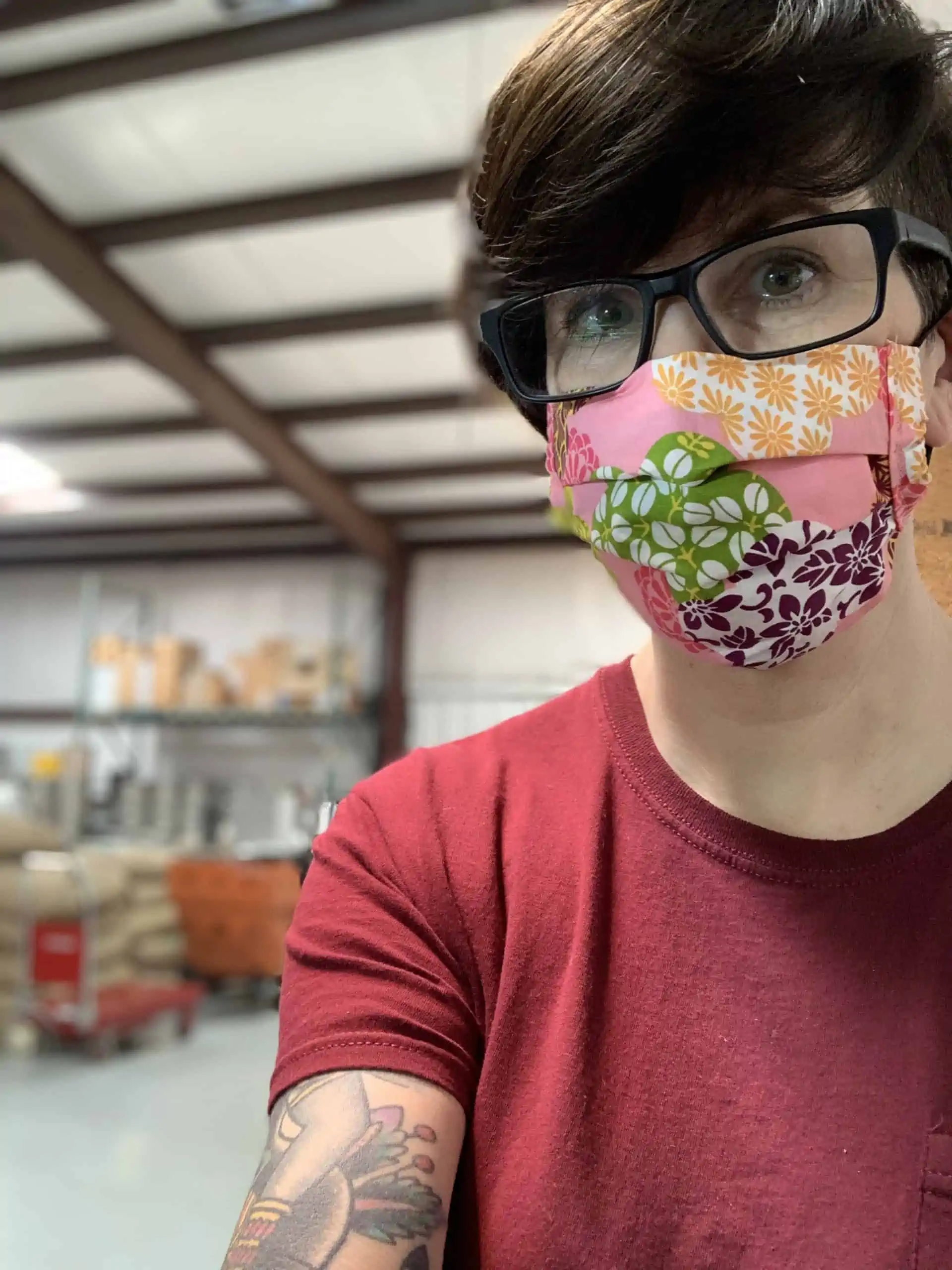
Sara Gibson roasting the Ethiopia Suke Quto at Greater Goods Roasting in Austin, Texas. Courtesy of Sara Gibson.
Most coffees from Ethiopia are produced by collectives or groups of smallholding farmers, and quality is mainly controlled at the level of the communal mill that processes them. This coffee is spearheaded by a single farmer, Ato Tesfaye Bekele, who works with neighboring farmers to tend trees planted in the volcanic soil and ensure both crop quality and land stewardship. Greater Goods head roaster, Sara Gibson, says, “This coffee is great for the desert island of the soul that is social distancing because it’s complex, surprising, and totally delish. It mutates in interesting ways when brewed by different methods, so it can keep you endlessly entertained. In cupping, we get notes of papaya, blueberry cheesecake, and a hard-to-pin-down floral note, like rose hips or rose petal tea. The green has organic and Rainforest Alliance certifications.” We here at CR also think it is downright nectar-like, further complicated by an intriguing brambly herbaceousness.
From Kenya to Taiwan, With Love
Kenya Tuikit Factory AA/ Kakalove Café/Chia-Yi, Taiwan (95 points)
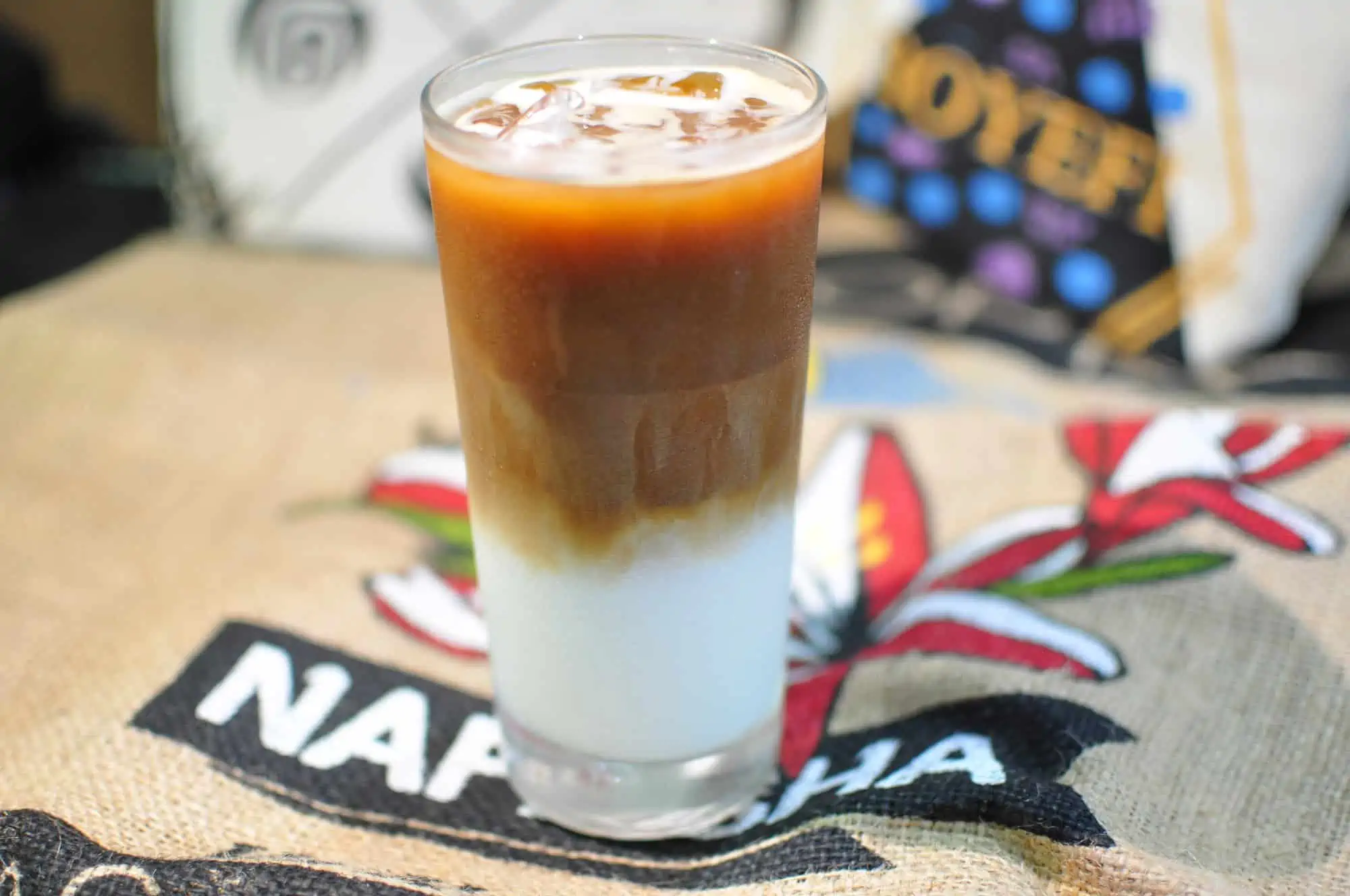
Kakalove Café’s Kenya Tuikit Factory AA with milk. Courtesy of Caesar Tu.
Owner/roaster Caesar Tu of Kakalove Café in the small city of Chia-Yi, Taiwan is no stranger to Coffee Review’s pages. Across 91 reviews since 2013, Tu’s coffees have ranged in score from 91-96. This Kenya astonished us with its provocative savory-leaning structure and deep, umami-tending flavor profile. While Tu says this Kenya is beautiful as a single-origin espresso, he also says that his customers approach it like they would afternoon tea: “When people are too lazy to use the espresso machine, they brew a toffee-style coffee with 60% coffee and 40% milk.” I tried this method one morning for breakfast with a full-fat, grass-fed local milk and got the concept, reminiscent of a café au lait. I also love this Kenya as a pourover, evocative for me of creosote aromas in the desert, perhaps after a sudden rain.
The Deep and Abiding Comfort of Kona
Karen J Kona Red Bourbon/Hula Daddy Kona Coffee/Holualoa, Big Island of Hawai’i (94 points)
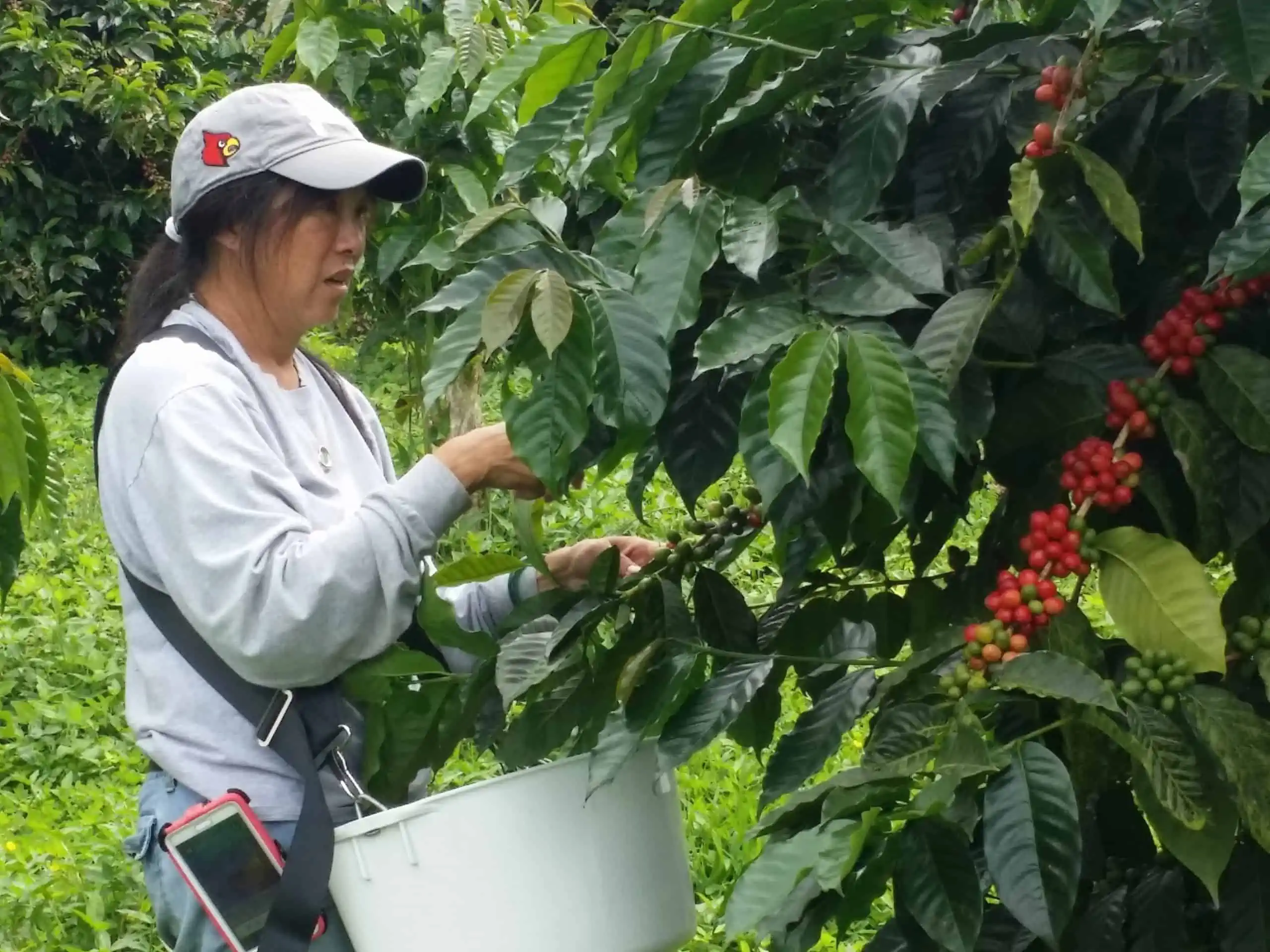
Karen Paterson, co-founder of Hula Daddy Coffee, picking Red Bourbon on her farm in Kona. Courtesy of Lee Paterson.
Hawaii is the only coffee-producing region of the U.S. (slowly emerging California notwithstanding), and Kona is its most familiar face. Hula Daddy is one of the producers leading the quality charge there, and its classic Karen J Red Bourbon (named for co-founder Karen Paterson) is the epitome of a comfort coffee. Co-founder Lee Paterson explains, “There is a place for exciting, crazy coffees, like Geisha and Pacamara — but not now. This is a time of great stress and uncertainty. We all need peace and comfort. Karen J Red Bourbon is a sweet coffee with amazing fruit flavors. If you want a feeling of well-being and a mental uplift in a trying time, this is the coffee for you.”
Panama Tropical Paradise
Abu Natural Panama Geisha/Klatch Coffee/Los Angeles, California (94 points)
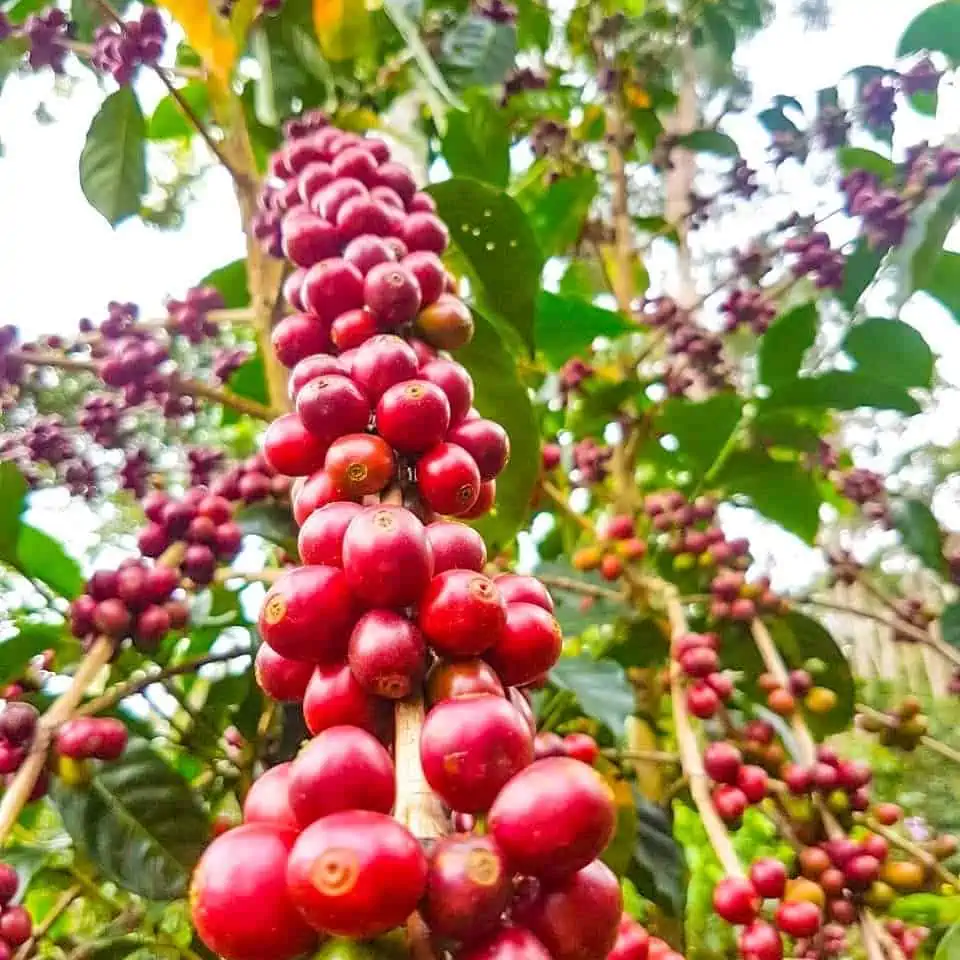
Geisha growing at Abu Farm in Boquete, Panama. Courtesy of Klatch Coffee.
Klatch owner Mike Perry says of this palate-trip of a coffee, “It has so many different flavors, it’s like taking a vacation to a different place with every sip.” We settled on tropical and stone fruit as the core, aromatically rife with papaya and black cherry notes, along with honeysuckle-like florals. Translated into travel, we’ll go for the rainforests of Costa Rica (tropical papaya), Veracruz Mexico for the dark stone fruit, and the American South for honeysuckle. It’s a Spring Break we’ll happily sign up for.
A Rare Variety With Consciously Cultivated Alcohol Notes
Colombia Finca Las Margaritas Natural Sudan Rume/modcup/Jersey City, New Jersey (94 points)
https://www.instagram.com/p/B_xzrfjDO7G/?utm_source=ig_web_copy_link
It’s a love-hate proposition. If you only drink super-clean washed-process coffees without a whisper of ferment, then you might not even recognize this natural-process Sudan Rume as coffee. And if you do, you’ll think it’s an Italian caffè corretto, a shot of espresso spiked with grappa. Go ahead and give it go, perhaps in the afternoon when you’re ready for an early intimation of cocktail hour. Jersey City roaster modcup’s co-founder Travas Clifton says, “We have been holding back the release of this rare microlot for just the right moment. Sourced from Café La Granja in Colombia, this is an incredibly complex coffee unlike anything we’ve ever tasted. This coffee gives us hope during this second month of lockdown.” If you’re already a fan of fruit-bomb naturals, jump aboard for a fruity, chocolaty, heady-fermenty ride.
A Sidra with a Name Like a Song
Ecuador Finca Carolina Sidra/Paradise Roasters/Minneapolis, Minnesota (94 points)
https://www.instagram.com/p/B-niFPkBDi3/?utm_source=ig_web_copy_link
Why did Paradise owner/roaster Miguel Meza choose this as his desert-island coffee? He says, “To me, this coffee is a glimpse of the future, of hope. A future to look forward to. Sidra is a hybrid of Ethiopian lines which, even at this farm’s modest altitude, produces an exemplary cup. Recently released hybrids like this one, and those in development that incorporate genetics from Ethiopian landraces, offer a lot of promise in terms of flavor profiles, productivity, disease resistance, and adaptability to a changing world. To me this coffee showcases a delicious profile of what our daily cup might taste like many years from now.”
And it’s a delicately complex cup, evocative of bergamot, ginger blossom, cardamom — floral, fruit and spice notes that wake us up ever so gently, with a name as lyrical as a song: Ecuador Finca Carolina Sidra. This might be your new coffee mantra.
Natural Ethiopia Gesha for a Chill Vibe
Gesha Village Single-Variety Gesha Special Selection/Plat Coffee Roastery/Hong Kong, China (94 points)

Roasting during the pandemic at Plat Coffee in Hong Kong. Courtesy of Raymond Cheung.
A 180-degree spin on the modcup Sudan Rume, this Gesha Village is as classic as natural, dried-in-the-fruit processed coffee gets. Produced on Adam and Rachel Overton’s Gesha Village estate from trees they planted from seed selected from wild trees of the Geisha variety in the nearby Gori Gesha forest in collaboration with members of the indigenous Meanit community, it’s clean, balanced, pure — a recipe for mental health, perhaps? Plat owner Raymond Cheung describes this cup as reminiscent of “a walk in a garden with the sunlight streaming down. Mellow.” We would agree, and we dig it.
Food-Friendly Nostalgic Congo
DR Congo Muungano/ Café Grumpy/Brooklyn, New York (93 points)
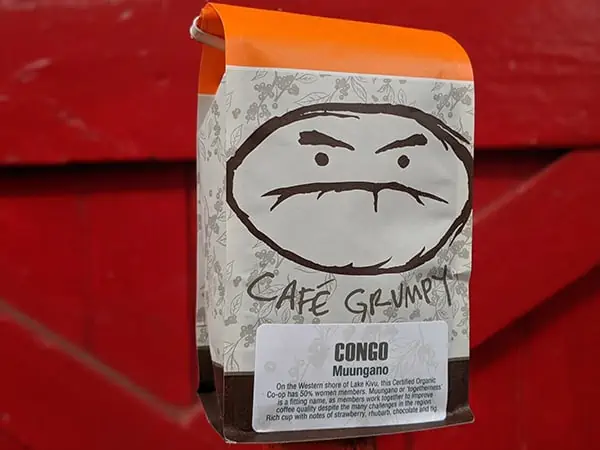
Café Grumpy Congo Muungano. Courtesy of Caroline Bell.
Founder/CEO Caroline Bell of Brooklyn’s Café Grumpy says, “Unfortunately, we had to close our cafés on the evening of March 15th, so were uncertain as to how to continue. We decided to launch this coffee, anyway, through our online shop. We have also been drinking it every morning at the roastery. It has been the part of the day we all look forward to the most. Not only does the name Muungano mean ‘togetherness,’ but when we drink it, we appreciate all of the times we were able to share coffee with friends and colleagues. We find this coffee surprising, yet approachable, with a full silky body and notes of strawberry, rhubarb, chocolate-covered fig and creme brûlée. It has been a constant, comforting companion for us.”
It tapped a deep well for Jason, who was catapulted back to childhood memories. The “oceanic” mouthfeel of this “relaxed and enveloping brew” evokes summer swimming for him. And while he enjoyed it on its own, he adds, “This coffee belongs paired with a comforting meal.”
Sultry, Sweet-Savory Sumatra
Sumatra Lintong Triple-Picked Reserve/Cloud City Coffee/Seattle, Washington (93 points)
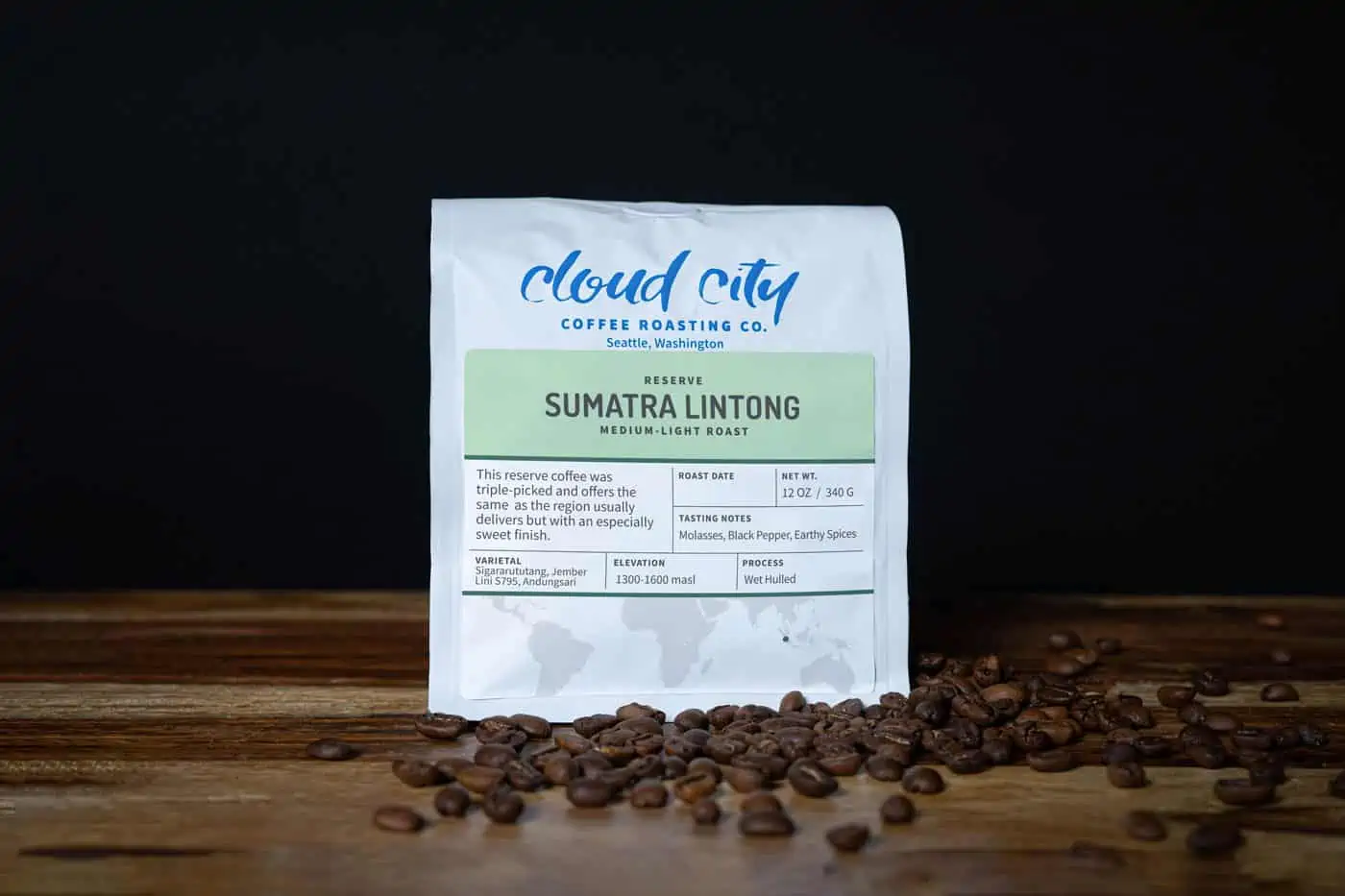
Cloud City’s Sumatra Lintong. Courtesy of Jill Killen.
Cloud City owner Jill Killen says, “I have long enjoyed Sumatran coffees because I believe firmly in meeting a coffee where it is. Sumatran and Indonesian coffees are earthy and savory and usually have great body — I always appreciate those qualities most. But when I find a clean, sweet take on this origin, I am overjoyed. This coffee definitely fits that bill. I chose it for my desert-island coffee because it’s a coffee you can drink every day. It tastes perfect black, but then you try it with milk and you can’t believe the chocolaty nuances that come up. Stuck on a desert island (or at home, as the case may be)? Sumatra Lintong, please.”
For Ken, “This is just a great, classic Sumatra. Those who like traditional Sumatras might drink so much of this one during a long quarantine that they might have to go to detox or a sleep lab afterwards. Sweet, juicy (apricot? black currant?), but enveloped in dry chocolaty, vaguely smoky, malty earth tones. Restful yet intriguing.”
Fourth-Wave Diner Coffee?
Colombian/Durango Coffee Company/Durango, Colorado (93 points)
https://www.instagram.com/p/B91ZjWenUNW/?utm_source=ig_web_copy_link
We all liked this coffee, but Ken especially took to it, aptly identifying it as a “Platonic Colombia: Big, roundly bright, classic — diner coffee in heaven.” Carl Rand, Durango’s owner/roaster says, “The intense jammy citrus notes make it a standout, a special treat for those long hours working from home in front of the computer. This coffee is like putting on your furry slippers for a long day of work at home. If this was the only coffee I had while stranded at home, on my desert island, I would be sad to not be able to invite all my friends over to enjoy it with me.” Ken adds, “If you think washed Ethiopias are too perfumy, natural Ethiopias too lush, Kenyas too kinky, Brazils too quiet, then settle in with this one — a classic Latin America-style coffee on steroids.”
Magnolia’s Namesake Trifecta
Magnolia Blend/Magnolia Coffee Company/Charlotte, North Carolina (93 points)
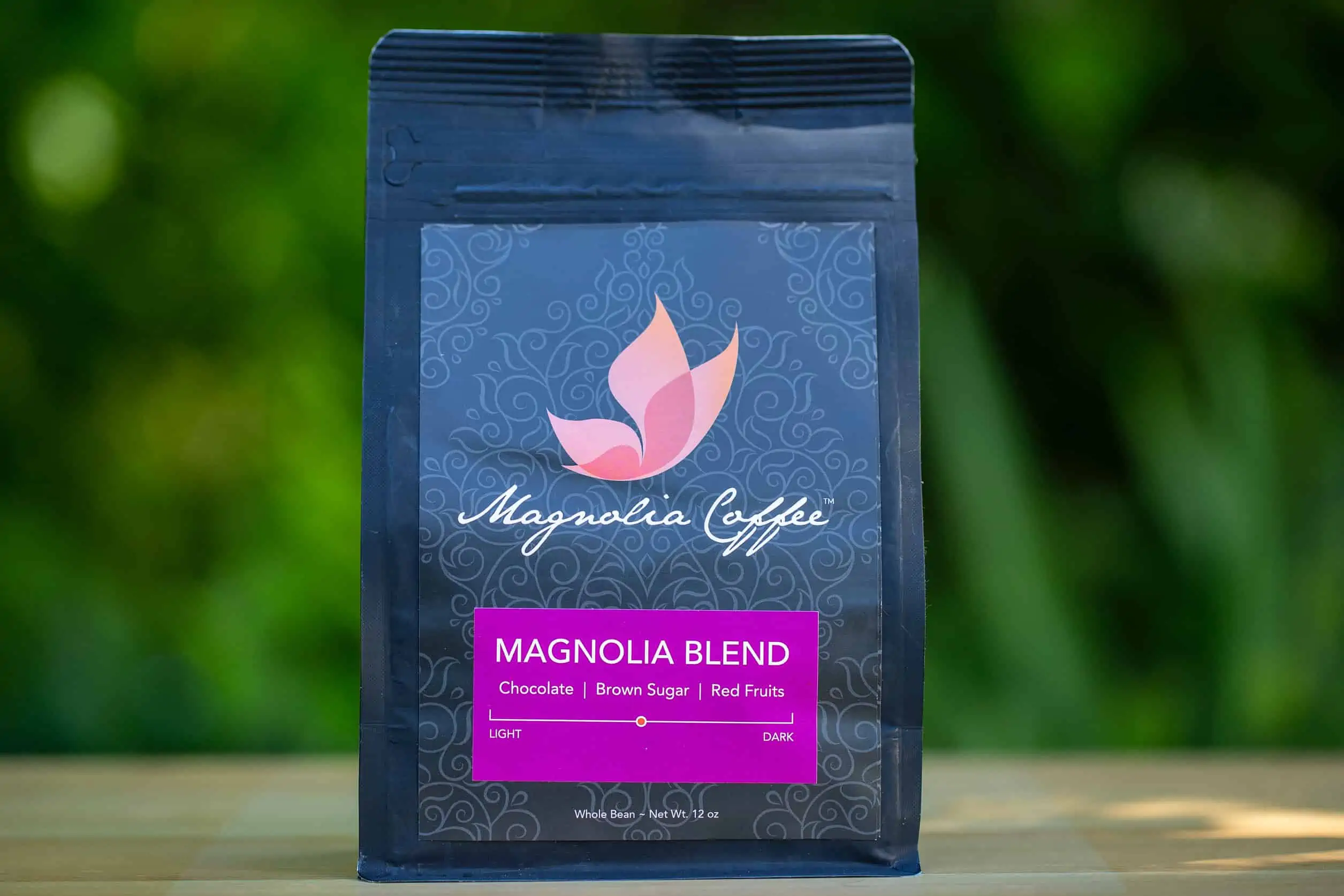
Magnolia Blend from Magnolia Coffee Roasters in Charlotte, North Carolina. Courtesy of Magnolia Coffee.
Jay Gestwicki, Magnolia Coffee founder says, “We discovered that three of our coffees we have sourced for years as wonderful single-origin coffees could be combined to create a new harmony of flavors not possible on their own. We used a special coffee from Papua New Guinea to create a medium body and creaminess with dark chocolate notes. We paired it with our direct-trade Costa Rica Naranjo La Rosa to add milk chocolate tones and light citrus notes. Then, we used a touch of our award-winning Costa Rica Cumbres Del Poas Perla Negra to add additional fruit nuance and natural sweetness. Our roaster, Ben Alleman, nailed each roast. He’s a true culinary artist. Magnolia Coffee is currently just the two of us, and we worked together to refine what is a ’masterpiece’ to us, and what we believe others will find comfort in every day.”
The Coffee Review team found it to be an impeccable medium-roasted blend, with all those deep chocolate notes Alleman was going for, with a light, deft touch that brings out layers and layers of fruit.
Under-the-Radar Rwanda Richness
Rwanda Gatare Namasheke/Temple Coffee Roasters/Sacramento, California (93 points)
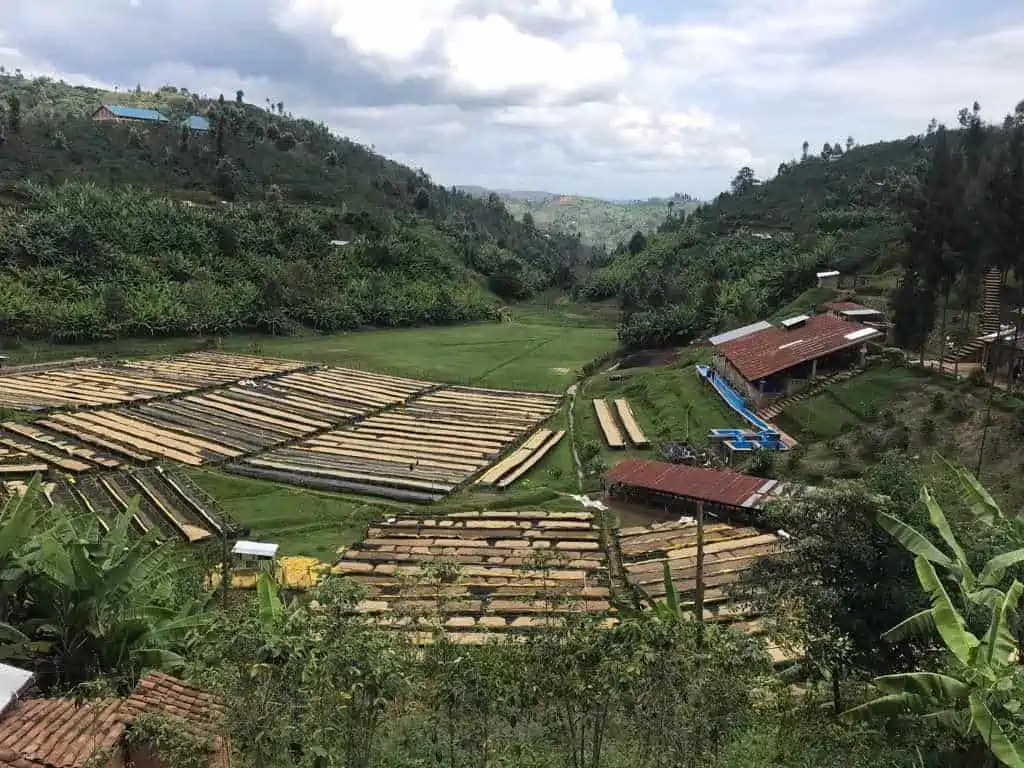
Coffee drying on raised beds in Rwanda. Courtesy of Falcon Coffee/ Brian Speckman
In 1994, the genocide of approximately 657,000 Tutsis by ethnic-majority Hutus pushed international development agencies into an urgent search for ways to bring economic growth and social healing to Rwanda. They found it in the country’s potential for producing high-end specialty coffee: in its Arabica-friendly terroirs, its traditional tree varieties celebrated for their distinctive cup character, and its smallholding, hard-working coffee farmers. In just a few years, Rwanda graduated from minor, overlooked supplier of commodity coffee to celebrated source of distinctive specialty types.
Temple’s Director of Coffee, Ed Whitman, loves coffees from this origin for their distinct but approachable floral, fruity and brown sugar flavors. Because he finds them to be delicious hot or iced, they’re Whitman’s desert-island coffee. We picked up on that characteristic brown sugar note, too, as well as cocoa and stone fruit notes typical of African Great Lakes coffees.
The Faraway Nearby
Ethiopia Konga/The WestBean Coffee Roasters/San Diego, California (93 points)
https://www.instagram.com/p/B-uiDF1jkOK/?utm_source=ig_web_copy_link
“We chose this washed Konga as a great “desert island” coffee due to its everyday drinkability,” says Andrew Karr of The WestBean. He adds, “It has a nice complex mouthfeel and is comforting to wake up with every morning. We have been enjoying it as a Kalita Wave pourover, but it is a really versatile coffee that has been delicious every single way we have brewed it.” We at CR took pleasure in its paradoxical sweet and tart, crisp and fruit-toned cup profile that speaks of distant lands in a familiar voice — fulfilling Rebecca Solnit’s notion of “the faraway nearby.”
Wherever your contemplative and somatic pleasure antennae lead you, these 15 coffees represent some of the very best coffees in the world, and this is the perfect moment in time to channel your sensory prowess and discover where they might take you — virtually, of course.





